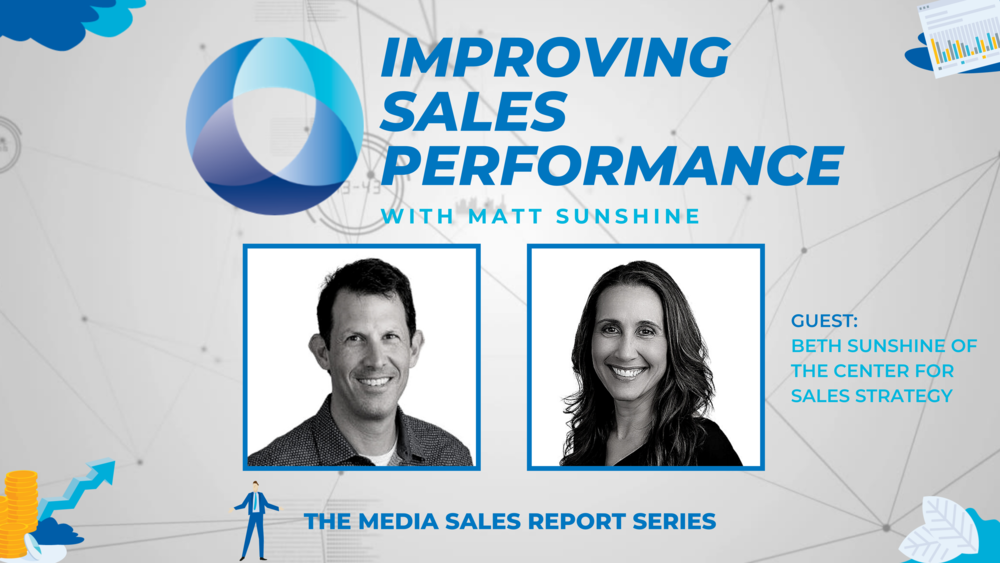
Throughout season 2 of the Improving Sales Performance Series, we’ve focused on the data and analysis of the newly released Media Sales Report.
In this episode, Beth Sunshine, VP of Talent Services, joined Matt Sunshine to discuss the Sales Department Structure section of the Media Sales Report, specifically looking at data on hiring and talent.
You can stream it now to hear their insight, advice, and initial thoughts after analyzing the data that was just published. Or keep reading for a brief overview.
Hiring, Selecting, and Using Talent Assessments
One of the things that makes The Center for Sales Strategy (CSS) special is that we have a reason for being — Turn Talent Into Performance.
What does that mean?
Beth explains it perfectly during the beginning of the interview, “It means everyone has talent (potential). We provide managers with consulting and salespeople with training. In other words, we work with companies to understand the talents people have and to help select people that have the right talents for the job …and beyond that to coach them in a way so they reach their full potential.”
If you’re not given the opportunity to refine talent, then it will never become a strength. Turning talent into performance is the end goal. As Matt adds, “Just identifying talent is smart and good, but having people reach their full potential is key.”
At CSS, we help clients with recruitment, selection, development, and engagement. You must fulfill them all to reach top performance.
What Managers Should Know and Look for When Selecting Candidates
Before embarking on your search or selection process, we encourage managers to perform this job and specification analysis by considering what’s particularly unique about this specific opening.
This worksheet helps you think in terms of talent, skills, and experience -- all important components of the hiring process. When using this resource, you’ll look at:
- What natural behaviors someone needs to have in order to be successful in that specific role
- What skills you want them to come with versus what you’re willing to teach
- And what experiences you want them to have
As Beth states, “The Job Analysis and Specification Worksheet is a great tool to help get you there but think about the job and the role first. What does excellence look like in that position?”
Often, hiring managers get addicted to hiring for one thing — like skills or experience — but ideally, you need a combination of talent, skills, and experience.
The Difference Between Talent Assessments and Personality Assessments
The 2020 Media Sales Report found that 85% of sales managers use some form of a talent assessment.
Of those 85% of sales managers, 85% thought the results from talent assessments were very accurate. This finding lead Matt to ask, “With so many assessments on the marketing, what is the difference between a talent assessment and personality assessment?”
Beth gives the perfect explanation, “You need to know what the assessment you’re using was built to do. The sales talent assessment we use are descriptive (like personality tests) but the big difference maker is that they’re predictive.”
Talent assessments are designed to assess the behaviors specific for the job in which you’re hiring. What makes someone outstanding in one job, may not make them great for another role.
Sales Talent Assessment at CSS
Through our partnership with Talent Plus, we’re certified to administer and analyze four of the very best validated talent assessments on the market today. Talent Plus is a world leader in talent assessment design for organization looking to become talent-based organizations. That means they want to hire the right people and put those people in the right jobs and coach them to grow.
Talent Plus studies a job and what behaviors make someone outstanding in that job — making their assessments well-researched and extremely accurate. Additionally, all biases are factored into the research process, so it doesn’t discriminate against age, gender, or experience.
As Beth points out, “On average, when someone makes a hire blindly, they typically get it right 50% of time without talent assessment. With a talent assessment, they can hire strictly based on recommendation and they get the hire right 4 out of 5 times. When you work with a Talent Analyst, you see even better results.”
Screening Candidates
Let’s be honest — you’re using something to screen candidates — typically this is something as simple as a resume.
When you work with a company that strives to turn talent into performance, you screen candidates from the very beginning with a sales talent assessment. When used in the beginning, before any other interaction occurs, you’ll know their talents and strengths.
A talent assessment will tell you what someone’s talents and strengths are, but it will also help guild you on how to coach them. For a detailed example of this, tune into the show at 24:27!
When you understand each unique person on your team, you can turn talent into performance!
Don’t miss another episode of the Improving Sales Performance series where Managing Partner Matt Sunshine speaks with thought leaders, experts, and industry gurus, who share their insight, tips, and knowledge on various topics that help companies improve sales performance.
Subscribe to our YouTube channel, and have your notifications on so you’re notified of our next episode!





